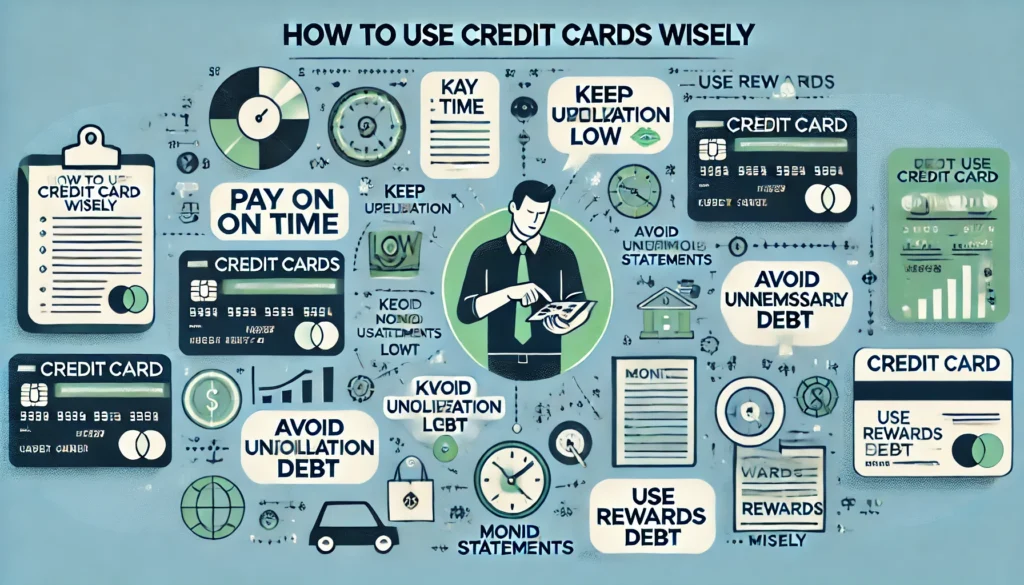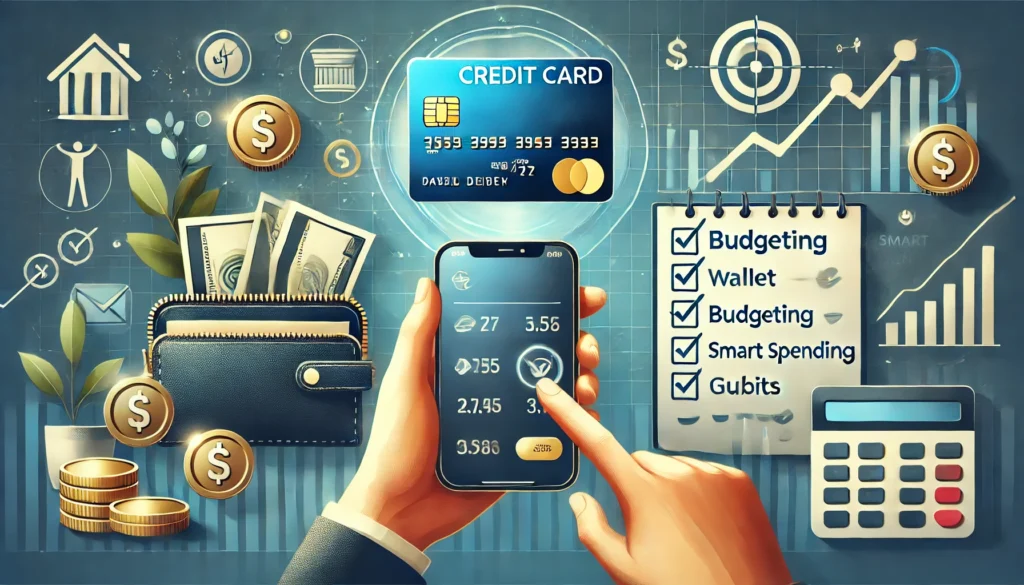A Step-by-Step Guide to How to Use Credit Cards Wisely

In How to Use Credit Cards Wisely, we’ll explore practical tips and strategies to help you use credit cards wisely and avoid common pitfalls. Credit cards are powerful financial tools that can make your life easier, help you build credit, and even earn rewards. However, if not used wisely, they can lead to debt, financial stress, and long-term money problems. The key to using credit cards effectively lies in understanding how they work and adopting smart habits.
Understand How Credit Cards Work:
Before using a credit card, it’s essential to understand the basics. A credit card is essentially a short-term loan. When you make a purchase, the card issuer pays the merchant on your behalf, and you repay the issuer later. If you don’t pay the full amount by the due date, interest (also known as the Annual Percentage Rate or APR) is added to your balance.
Key terms to know:
- Credit Limit: The maximum amount you can spend on your card.
- Statement Balance: The total amount you owe at the end of a billing cycle.
- Minimum Payment: The smallest amount you must pay to avoid late fees.
- APR: The interest rate charged on unpaid balances.
Understanding these terms will help you make informed decisions and avoid surprises.
Choose the Right Credit Card:
Not all credit cards are created equal. Some offer rewards like cashback, travel points, or discounts, while others have lower interest rates or no annual fees. To use a credit card wisely, choose one that aligns with your spending habits and financial goals.
- If you plan to pay off your balance in full each month, a rewards card might be a good choice.
- If you anticipate carrying a balance, look for a card with a low APR.
- Avoid cards with high annual fees unless the benefits outweigh the cost.
Take time to compare different cards and read the fine print to understand fees, interest rates, and rewards programs.
Create a Budget and Stick to It:
One of the biggest mistakes people make with credit cards is overspending. To avoid this, create a monthly budget that outlines your income, expenses, and savings goals. Use your credit card only for purchases you can afford to pay off in full.
A good rule of thumb is to keep your credit card spending below 30% of your credit limit. This not only helps you manage your finances but also improves your credit score.
Pay Your Balance in Full and On Time:
Paying your balance in full every month is the best way to use a credit card wisely. It helps you avoid interest charges and keeps your debt under control. If you can’t pay the full amount, aim to pay more than the minimum payment to reduce interest costs.
Late payments can hurt your credit score and result in hefty fees. Set up automatic payments or reminders to ensure you never miss a due date.
Avoid Cash Advances:
Credit cards allow you to withdraw cash from an ATM, but this is one of the costliest ways to use your card. Cash advances typically come with high fees and interest rates, and interest starts accruing immediately. Unless it’s an emergency, avoid using your credit card for cash withdrawals.
Monitor Your Spending:
It’s easy to lose track of your spending when using a credit card. To stay on top of your finances:
- Check your account regularly to monitor transactions.
- Use mobile apps or online banking to track your spending in real-time.
- Review your monthly statements to spot any errors or unauthorized charges.
By keeping a close eye on your spending, you can avoid overspending and detect fraud early.
Take Advantage of Rewards and Benefits:
Many credit cards offer rewards programs, such as cashback, travel points, or discounts on specific purchases. To use your card wisely, take full advantage of these benefits. For example:
- Use a cashback card for everyday expenses like groceries and gas.
- Use a travel rewards card for flights and hotel bookings.
- Look for cards that offer sign-up bonuses or special promotions.
However, don’t let rewards tempt you into spending more than you can afford. The goal is to earn rewards on purchases you were already planning to make.
Avoid Impulse Purchases:
Credit cards can make it tempting to buy things you don’t need. To avoid impulse purchases:
- Give yourself a cooling-off period before making big purchases.
- Ask yourself if the item is a want or a need.
- Stick to your budget and avoid shopping when you’re emotional or stressed.
Remember, every purchase you make on your credit card is money you’ll need to repay later.
Keep Your Credit Utilization Low:

Credit utilization is the percentage of your credit limit that you’re using. For example, if your credit limit is $5,000 and you’ve spent $1,000, your credit utilization is 20%. A low credit utilization ratio (below 30%) is good for your credit score.
To keep your utilization low:
- Pay off your balance multiple times a month if needed.
- Request a credit limit increase (but only if you can resist the temptation to spend more).
- Avoid maxing out your card, even if you plan to pay it off.
Be Cautious with Balance Transfers:
Balance transfers allow you to move debt from one credit card to another, usually with a lower interest rate. While this can help you save on interest, it’s important to read the terms carefully. Many balance transfer offers come with fees and introductory rates that expire after a few months.
If you decide to use a balance transfer:
- Pay off the transferred balance before the introductory rate ends.
- Avoid making new purchases on the card until the balance is paid off.
Protect Your Credit Score:
Your credit score is a key factor in your financial health. It affects your ability to get loans, rent an apartment, or even land a job. To protect your credit score:
- Pay your bills on time.
- Keep your credit utilization low.
- Avoid applying for too many credit cards in a short period.
Regularly check your credit report for errors and dispute any inaccuracies.
Know When to Say No:
Credit card companies often entice customers with attractive offers, such as higher credit limits or pre-approved cards. While these offers can be tempting, they’re not always in your best interest. For example, a higher credit limit might lead to overspending, and applying for multiple cards can hurt your credit score.
Learn to say no to offers that don’t align with your financial goals.
Have an Emergency Fund:
Relying on credit cards for emergencies can lead to debt. Instead, build an emergency fund with three to six months’ worth of living expenses. This way, you’ll have cash on hand for unexpected expenses and won’t need to rely on your credit card.
Educate Yourself About Fees:
Credit cards come with various fees, including annual fees, late payment fees, foreign transaction fees, and balance transfer fees. To use your card wisely:
- Understand the fees associated with your card.
- Avoid unnecessary fees by paying on time and staying within your credit limit.
- Choose a card with no or low fees if possible.
Seek Help if You’re in Trouble:
If you find yourself struggling with credit card debt, don’t wait to seek help. Consider speaking with a financial advisor or credit counselor who can help you create a debt repayment plan. Many nonprofit organizations offer free or low-cost counseling services.
Recommended: How to Avoid Common Investment Mistakes
Conclusion
Using credit cards wisely requires discipline, knowledge, and careful planning. By understanding how credit cards work, choosing the right card, and adopting smart spending habits, you can enjoy the benefits of credit cards without falling into debt. Remember, a credit card is a tool, not free money. Use it responsibly, and it can help you build a strong financial future.
